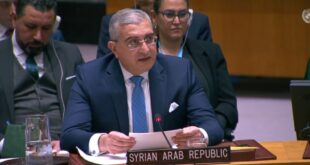Berlin, SANA-Berlin 21 Group said that the investigations by the Organization for the Prohibition of Chemical Weapons (OPCW) on the alleged use of chemical weapons in Syria, specifically in Douma in April 2018, concealed a lot of evidence and facts.
In a letter addressed to the Syrian Permanent Mission and representatives of international missions to OPCW, the group said that “the Director-General of the organization has ‘taken note’ of the Berlin Group’s review, but has so far failed to provide any substantive response to the substantive issues raised by that review
The letter noted that since then, a report on the controversy over the OPCW and the 2018 Douma incident has come to light, focusing on irregularities committed by the organization in its investigations in Syria.
The report suggested restoring the OPCW’s credibility by ensuring its full compliance with the Chemical Weapons Convention, and called on senior management to address concerns raised by former OPCW experts Brendan Whelan and Ian Henderson.
The letter also emphasized procedural and substantive aspects of its prior review of the incident, as well as the findings of the MEPs’ report, through the following points:
-In June 2018, the original report of the fact-finding mission was secretly altered at the last minute, and its main conclusions were concealed, while the use of chlorine gas was misleadingly hinted at without scientific evidence.
This incident confirms that one or more OPCW officials conspired to try to publish a scientifically misleading report.
-The original toxicology report submitted by NATO chemical warfare experts indicated that the 43 civilian victims were not killed by chlorine gas, a finding that was subsequently ignored.
Misleading claims were made in the 2023 by Investigation and Identification Team report to suggest otherwise.
-The organization’s reports adopted a clear pattern of distortions that involved ignoring inappropriate witness testimony, exaggerating chemical analyses, and obscuring important scientific studies.
These scientific deficiencies in the OPCW reports on the Douma incident mean that the central claim that there were reasonable causes for the alleged chemical weapons attack is inaccurate and that the fact-finding missions were clearly operating outside the framework of the Chemical Weapons Convention.
-OPCW fact-finding missions are temporary mechanisms with no agreed procedures in any intergovernmental treaty, and lack transparency and accountability, being controlled exclusively by the office of the Director-General, creating opportunities for undue political influence.
The Berlin 21 group urged the permanent missions to the OPCW to support its fight against these irregularities and to obtain responses from the Director-General on the issues raised.
Fedaa al-Rahai
 Syrian Arab News Agency S A N A
Syrian Arab News Agency S A N A

